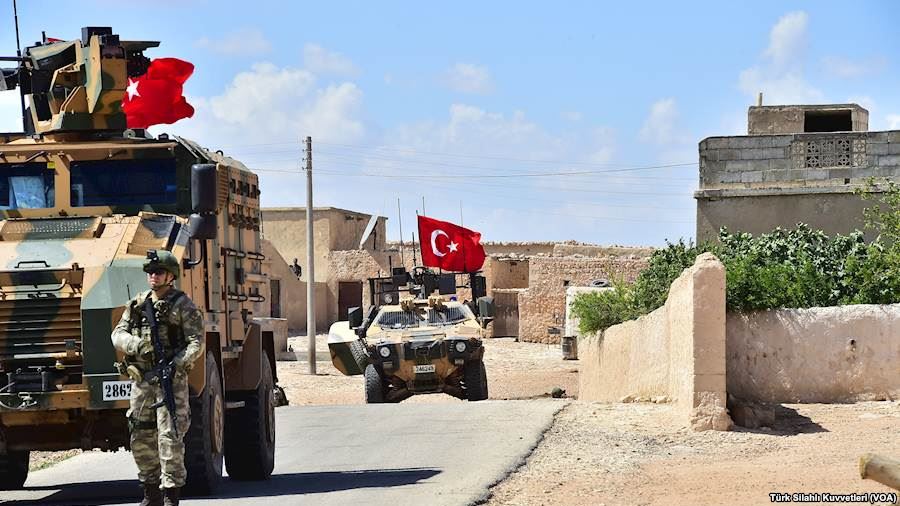
THE TRUTH ABOUT TURKEY’S ROLE IN SYRIA
Sunday, March 1, 2020
By David L. Phillips
Turkey’s President Tayyip Erdogan asked NATO to invoke its mutual defense pact when 36 Turkish troops were recently killed by Russian and Syrian forces in Idlib, Syria. His request is cynical and self-serving. Erdogan betrayed the Alliance, siding with Russia in a war he helped foment.
After the 2011 popular uprising in Dara’a, which marked the beginning of Syria’s civil war, Erdogan embraced the Muslim Brotherhood and supported Islamist rebels fighting the regime of Bashar al-Assad. Erdogan envisioned himself the Caliph of Mesopotamia, leading a worldwide community of Sunni brothers.
Erdogan made Turkey the major conduit for weapons and money conveyed to jihadists in Syria. At the time, he thought the victory of jihadists was inevitable. However, Assad’s forces were tenacious.
President Barack Obama promised regime change and drew a red line on the use of chemical weapons (CW). More than 1,300 people, including hundreds of children, were killed in the Damascus suburbs of Ghouta, Muadhamiya, Ein Tarma, and Zamalka on 21 August 2013. Obama had no appetite for military intervention. He claimed the red line was a warning, rathern an actual threat to intervene.
Left to his own devices, Erdogan expanded support for the rebels. Turkey’s National Intelligence Agency established the jihadi highway from Sanliurfa in Turkey to Raqqa, the ISIS capital in Syria. It assisted 40,000 foreign jihadists from more than 100 countries who transited through Turkey to the front line in Syria.
The presence of Chechens and other Islamists from the Southern Caucasus was deeply unsettling to Russia. Rebel advances presented a risk to Russian bases in Latakia and Tartous, threatening Russia’s warm-water port on the Meditarranean. Rebels also threatened Iran’s corridor through Iraq and Syria to Lebanon that was supplying Hezbollah with sophisticated missiles to attack Israel.
General Qassem Soleimani, head of the Iranian Revolutionary Guard (IRGC) Quds Force, visited Moscow to meet Russian defense officials in July 2015. Soleimani unfurled a map of rebel advances on Damascus. He assured the worried audience, “All is not lost.”
Russian and Iranian officials agreed on a plan to rescue Assad. The IRGC, Hezbollah, and other Shiite militias would join the Syrian Arab Armed Forces on the battlefield. Russia would provide air support. Putin announced Russia’s military intervention at the UN General Assembly on 28 September 2015.
Turkey and Russia were on opposite sides. Turkey supported regime change and gave weapons to the rebels, while Russia backed the regime.
Differences became disaster when a Turkish F-16 shot down a Russian Sukhoi-24 along the Syrian border on 24 November 2015.
Turkey was also alienated from the United States. The US and Turkey had a major falling out after Erdogan alleged America’s complicity in the so-called coup that summer. Pragmatic and transactional, Erdogan forged an alliance with Putin in Syria.
Marginalizing the UN and excluding the US, Turkey joined Russia in the Astana process.
Putin agreed to look the other way, while Turkish-backed jihadis and Turkish armed forces targeted the Syrian Kurds, who Erdogan called the “real terrorists.”
Turkey invaded Afrin in January 2018. The offensive, called “Operation Olive Branch”, killed hundreds of Kurds and displaced nearly a quarter million. Russia controlled the air space west of the Euphrates and was complicit.
Turkey invaded Kurdish lands east of the Euphrates in October 2019. Hundreds were killed and many displaced, including Kurds, Armenians and Syriac Christians. Turkey’s jihadist proxies committed atrocities, mutilating the bodies of female fighters.
Erdogan thought he could dissuade Putin from attacking Idlib, the last rebel stronghold in Syria’s Northwest. Despite assurances, Syrian ground forces backed by Russian air power intensified attacks, pushing 900,000 people from their homes. Turkey sealed its border leaving displaced Syrians with no place to go.
Turkey presents itself as the victim of actions by Russia and Syria. In fact, it is the aggressor. The violent conflict between Turkey and Russia in Idlib is a direct result of Erdogan’s ill-conceived bravado.
Now Erdogan wants NATO to intervene on Turkey's behalf. Article 5 of the North Atlantic Charter stipulates that an attack on one member of the Alliance is an attack on all.
However, Erdogan’s appeal has fallen on deaf ears. Erdogan's duplicity has riled the West. His anti-American, anti-European and anti-NATO positions have burned bridges.
For sure, any loss of life is regrettable. It is, however, hard to side with Turkey in its dispute with Russia when Erdogan’s actions led to Turkey’s woes.
Turkey intensified the civil war by supplying jihadis. Erdogan extorted money from the European Union to manage the refugee crisis, which he helped create. Just yesterday, Turkey was weaponizing refugees by dumping displaced people on the border with Greece. Turkey scorned UN diplomacy by joining the Astana process. It repudiated the US, spending $3 billion on Russian surface-to-air missiles.
Both Obama and Trump have assiduously avoided a slippery slope in Syria. Years ago, Obama missed an opportunity to intervene when intervention could have saved many lives.
Despite the heart-wrenching suffering of people in Idlib, the Trump administration is unlikely to get involved militarily. US officials should not ignore Erdogan’s hubris or excuse his bad judgement.
Mr. Phillips is Director of the Program on Peace-building and Human Rights at Columbia University’s Institute for the Study of Human Rights. He served as a Senior Adviser at the State Department during the Clinton, Bush and Obama administration. His forthcoming book is Front Line Syria: From Revolution to Proxy War (Bloomsbury).





